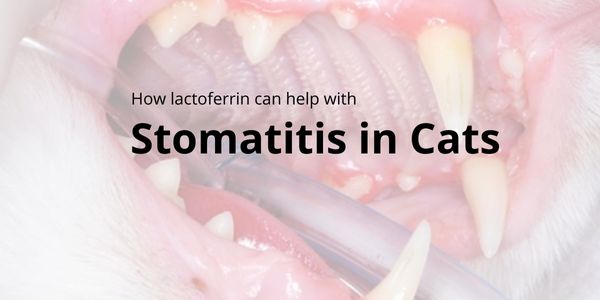Lactoferrin as a Treatment for Stomatitis in Cats
Stomatitis is an inflammatory condition of the oral cavity in cats that can cause severe pain and discomfort. Luckily, lactoferrin has been found to be a successful treatment for stomatitis in cats. Lactoferrin is a natural iron-binding protein that helps reduce inflammation and has antibacterial and antifungal properties. In this blog post, we will discuss the benefits of lactoferrin as a treatment for stomatitis in cats.
What is stomatitis?
Feline lymphocytic-plasmacytic gingivitis/stomatitis (LPGS) or caudal stomatitis is an inflammatory disease that causes painfully erosive lesions and proliferations of the oral mucosa. [1] It is characterized by lesions, ulcerations, and excessive salivation. It can be very painful and uncomfortable for cats. Stomatitis can be caused by a number of factors, including viral infections, allergies, autoimmune diseases, and dental diseases.
How does lactoferrin work?
Lactoferrin is a glycoprotein found in saliva, tears, and colostrum that has been studied as a potential treatment for stomatitis in cats. It works by reducing inflammation and modulating the immune system to reduce symptoms associated with the condition. Studies suggest that lactoferrin can help reduce the severity of stomatitis in cats and may even be used as a preventative measure to prevent further flare-ups.
How do I use lactoferrin?
Using lactoferrin to treat stomatitis in cats is relatively straightforward. You can purchase lactoferrin in powder form. To apply the powder, mix it with a bit of water to form a paste, and then apply it directly to your cat’s affected areas. Alternatively, you can dilute the lactoferrin powder with water, and then use a spray bottle to administer it onto your cat's gums and mouth area. It is important to be careful when applying lactoferrin so that you do not get it into the eyes or nose. If you do accidentally get some in the eyes or nose, rinse it off immediately with warm water. When using lactoferrin to treat stomatitis in cats, it is important to follow the instructions on the packaging and consult your veterinarian for advice on the most suitable dosage for your pet.
What are the side effects of lactoferrin?
Lactoferrin is a naturally-occurring protein that is generally well tolerated by cats when used to treat stomatitis. However, there are some potential side effects that owners should be aware of when using lactoferrin.
The most common side effects in cats include: itching, redness, swelling or irritation of the skin, gastrointestinal upset (vomiting or diarrhea), and decreased appetite. In rare cases, more serious side effects may occur such as difficulty breathing or anaphylactic shock. If any of these symptoms are observed, discontinue use and seek veterinary help immediately.
In addition to the side effects outlined above, some cats may also experience allergic reactions to lactoferrin. This can manifest in skin rashes, swelling, hives, or difficulty breathing. If you suspect your cat is having an allergic reaction to lactoferrin, it is important to stop giving the supplement and contact your veterinarian for advice.
Overall, lactoferrin is generally considered safe for cats with stomatitis when given as directed. To minimize the risk of side effects, it is important to follow your veterinarian’s instructions carefully when giving your cat lactoferrin.
Is lactoferrin effective?
The use of lactoferrin to treat stomatitis in cats is a relatively new concept, but preliminary studies suggest it may be effective. In one study, cats with stomatitis that were given a daily dose of lactoferrin showed improved clinical signs and reduced inflammation in the mouth. Additionally, the cats had fewer bacteria in their mouths and less severe stomatitis after treatment.
Referances & Sources
1."Bovine lactoferrin and piroxicam as an adjunct treatment for lymphocytic-plasmacytic gingivitis stomatitis in cats
https://pubmed.ncbi.nlm.nih.gov/24973002/
2. "Oral administration of bovine lactoferrin for treatment of intractable stomatitis in feline immunodeficiency virus (FIV)-positive and FIV-negative cats"https://pubmed.ncbi.nlm.nih.gov/8896681/

